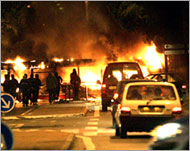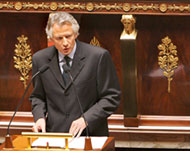Riots subside across France
Urban violence has dropped for the third straight night in France after the government adopted emergency powers, but a controversy has erupted over plans to expel foreigners caught rioting.

Two weeks of unrest in poor suburbs around France have badly rattled the conservative government and prompted Prime Minister Dominique de Villepin to invoke a 50-year-old law allowing local government officials to impose curfews and other restrictions.
The move coincided with a sharp fall in petrol bomb attacks on cars, buses, public buildings and police by youths angered by racism, unemployment and harsh treatment by police.
Many French people welcomed the government’s tough response but Villepin also faced accusations of over-reacting by reviving a measure dating from Algeria’s war of independence against its colonial master France.
“It’s calm. It’s subsiding,” said a spokesman for the Seine-et-Marne department east of Paris on Thursday.
The state’s top regional officials, or prefects, for the Nice (south), Orleans (centre), Evreux (Normandy), Rouen and Amiens (north) areas were the only officials to impose limited curfews.
“There are encouraging signs but there is no reduction in police presence,” an Interior Ministry spokesman said.
Arrests
On Wednesday night, youths torched 482 vehicles compared with 617 the previous night, and police said they had arrested 203 people, down from 280, according to Interior Ministry figures.
The poor suburbs of Paris where the riots erupted on 27 October were largely quiet and none of the prefects there took advantage of their new emergency powers to impose curfews.
 |
|
On Wednesday night, 482 vehicles |
Triggered by the deaths of two youths of African-origin who were accidentally electrocuted while apparently fleeing police, the rioting also gave vent to festering frustrations among poor white youths and French-born citizens of African and Arab origin over a sense of exclusion from mainstream society.
Interior Minister Nicolas Sarkozy, accused by opponents of stoking passions with his strong attacks on troublemakers, caused a new controversy by telling parliament that about 120 foreigners convicted of participating in the unrest would be expelled, even if they had residence permits.
“What we’re seeing is the restoration of ‘double jeopardy’,” Pierre Henry, president of the Terre d’asile association that works with immigrants, told the daily Le Figaro.
Sarkozy won plaudits from pro-immigrant groups three years ago when he abolished ‘double jeopardy’, a policy under which convicted foreigners are expelled after serving their sentence.
Grassroots funding
In an effort to end the unrest, Villepin pledged on Monday to restore some 100 million euros ($117 million) in funding for grassroots associations working in tough neighbourhoods, and improve prospects in education, the labour market and housing.
 |
|
De Villepin pledged $117 million |
But left-wing critics say he went too far by invoking emergency powers for 38 cities and suburban areas including Marseille, Strasbourg, Lyon and the capital Paris.
“Most elected officials on the ground appear to have been more embarrassed than relieved,” the left-leaning newspaper Liberation said in an editorial. “They fear this measure will further stir things up, or believe it to be either an over-reaction or totally useless.”
The measure has, nevertheless, won 73% support from the public, according to a poll in Le Parisien.
Fears
Fears that riots might erupt in other European countries have helped push down the value of the euro and damaged France’s image abroad, though Finance Minister Thierry Breton said the economy had been unscathed.
“This has had no impact on the nation’s economy at the macro-economic level,” Breton said on Europe 1 radio.
Opposition Socialists have voiced only muted criticism of the emergency measures, which they used in the mid-1980s.
The sudden explosion of violence has also added a new twist to the rivalry between Villepin and Sarkozy, possible candidates to lead the right in the 2007 presidential election. Villepin led Sarkozy in a new opinion poll published by Paris Match.